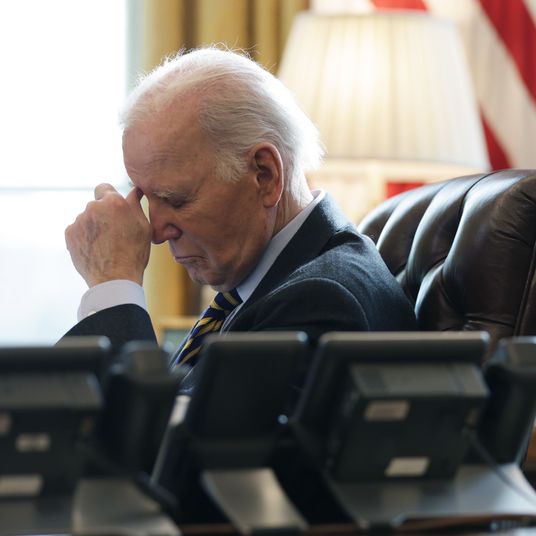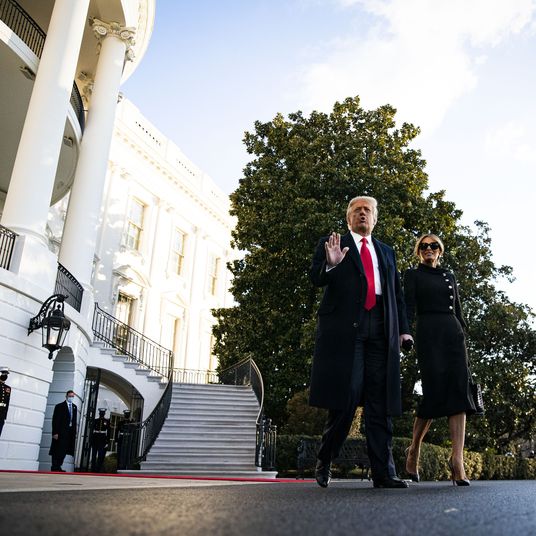
“It was the least I could do!”Getty Images
How the (time)tables have turned: Just last week the conventional wisdom said Barack Obama’s position on leaving Iraq was untenable, given the improvement in conditions there. But on Friday President Bush agreed to a “time horizon” for the withdrawal of troops with Iraqi prime minister Nouri al-Maliki, and on Saturday Maliki sent shockwaves through the campaigns when he told German magazine Der Spiegel that he pretty much favored Obama’s plan. Maliki soon backtracked, with a spokesperson lamely saying the remarks were “misinterpreted.” (As the New York Times demonstrates today, Maliki’s sentiments, if not their exact wording, were accurately portrayed.) And earlier today the Iraqi government expressed — in English — their support for the withdrawal of all troops by 2010. Just how high should Obama, who is preparing to depart Iraq to continue his global charm offensive, be flying?
• David Paul Kuhn writes that “[f]or the first time in the national security debate, Obama’s advisers believe that McCain has been placed on the defensive,” as his plan for Iraq “now differs not only with the position of his Democratic opponent but also with those of the White House and the Iraqi prime minister.” [Politico]
• Jonathan Martin notes that it’s not just Iraq: Recent events in Afghanistan and Iran have also “played into [Obama’s] message.” [Politico]
• Byron York believes Maliki’s comments, which “seemed to come straight from Obama’s talking points,” were a “major campaign coup.” [National Review]
• Jonathan Chait calls Maliki’s “endorsement” a “huge, huge deal.” McCain would have a hard time “paint[ing] Obama’s plan as wildly naive or irresponsible when the Iraqi government favors it too.” Even if Maliki is only supporting a timetable because of domestic pressure, as both President Bush and McCain have suggested, “that just underscores the point” since “this shows that the Iraqi polity is not going to stand for an extended occupation.” [Plank/New Republic]
• Michael Crowley wonders if the “shift in the Iraq debate” could benefit McCain instead of Obama, if it turns into a debate over who could “more effectively manage the logistics of wrapping things up.” [Stump/New Republic]
• Ezra Klein thinks the McCain campaign is “massively underestimating the psychological impact of Maliki’s statement” on American voters, many of whom are only supporting a continued presence in Iraq because they “feel a sense of responsibility to the Iraqi people.” But now, the logic goes, “If we don’t want to be there, and the Iraqis don’t want us there, what’s the point?” [American Prospect]
• Robert Reid contends that Maliki’s comments are “part of Baghdad’s strategy to play U.S. politics for the best deal possible over America’s military mission” by “exploit[ing] Obama’s position on the war to force the Bush administration into accepting concessions considered unthinkable a few months ago.” [Associated Press]
• Joe Klein thinks “this is all bad news for the McCain campaign.” Sure, he “was right about the Surge,” but that complicated matter is overshadowed by headlines like “Maliki Endorses Obama Withdrawal Plan,” which “everyone can understand.” [Swampland/Time]
• Mickey Kaus claims “[t]here’s a not inconsequential difference between” the Der Spiegel translation and the Times translation, as the latter “specifically does not ‘endorse’ the timetable,” though “Maliki does seem to endorse Obama’s general approach over McCain’s.” [Kausfiles/Slate]
• Chuck Todd and friends write that that the McCain campaign is frustrated because Maliki could have just as easily focused on the success of the surge. But because he focused on withdrawal, Obama “has the easier fact to sell: Maliki wants troops out in 16 months.” [First Read/MSNBC]—Dan Amira
For a complete and regularly updated guide to presidential candidates Barack Obama and John McCain — from First Love to Most Embarrassing Gaffe — read the 2008 Electopedia.





























